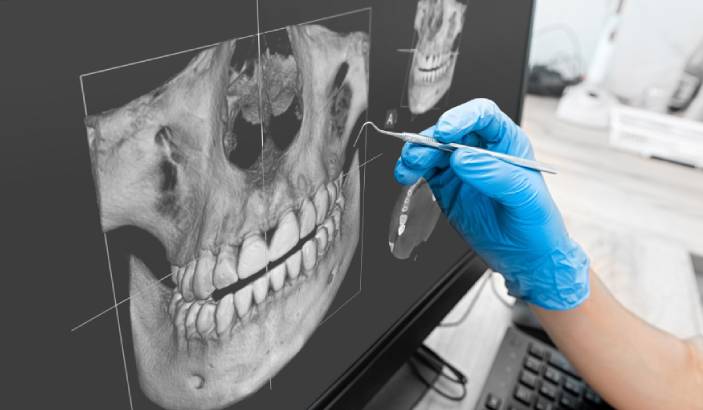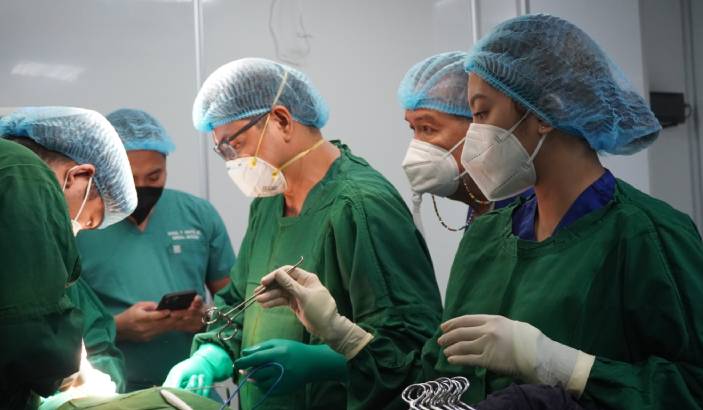Experiencing jaw pain is no trivial matter. Such discomfort could stem from various reasons: dental problems, temporomandibular joint (TMJ) disorders, nerve damage, or even certain heart conditions. It is essential to seek prompt medical attention to correctly diagnose and treat the underlying cause, alleviating pain and preventing further complications.
There’s no need to endure such pain unnecessarily when help is readily available. One might immediately think of visiting an emergency dentist when experiencing severe oral discomfort. This idea isn’t wrong. Indeed, an emergency dentist is often an ideal professional to address acute dental problems that could result in jaw pain.
Knowing When To Consult An Emergency Dentist
Emergency dentists specialize in addressing urgent dental issues that may arise unexpectedly. They are experts in providing immediate relief and preventing further damage. If your jaw pain is accompanied by severe toothache, swollen gums, loose or broken teeth, or injuries to the mouth, you should consult an emergency dentist.
Often, they can perform various procedures such as root canals, extractions, and treatment of oral infections, which can help alleviate your discomfort. However, it’s essential to remember that not all jaw pain originates from dental problems.
When To See An Oral Surgeon?
If you’re experiencing jaw pain beyond dental issues, it might be time to visit an oral surgeon. Impacted wisdom teeth, temporomandibular joint (TMJ) disorders, and oral cancer are some of the possible conditions that may cause jaw pain. An oral surgeon has the specialized training to effectively diagnose and treat these more serious conditions.
Knowing when to see an oral surgeon is essential in obtaining a correct diagnosis and treatment plan. An oral surgeon will assess the severity of your jaw pain, examine your oral health, and may take X-rays or CT scans to get a better understanding of the problem. If surgical intervention is necessary, the oral surgeon will inform you of the procedure’s nature, potential risks and complications, and possible follow-up care after surgery.
Consulting A Maxillofacial Radiologist
Consulting a maxillofacial radiologist can be beneficial if your jaw pain presents with no clear diagnosis. These specialists are trained in using imaging technologies to examine oral and facial structures in detail. With their expertise, they can identify subtle abnormalities that might cause jaw pain, such as fractures, tumors, or joint disorders.
Maxillofacial radiologists are skilled in interpreting X-rays, CT scans, and other imaging techniques to provide a more accurate and comprehensive diagnosis. Utilizing their knowledge and advanced imaging technology can help pinpoint the specific issue causing your discomfort and guide your healthcare team in developing an appropriate treatment plan.
Visiting A Neurologist For Jaw Pain
Jaw pain accompanied by symptoms such as numbness, tingling, or a sharp, shooting pain may indicate a nerve-related issue. In such scenarios, it is advisable to consult a neurologist for further evaluation. Neurologists specialize in diagnosing and treating conditions related to the nervous system that may lead to jaw pain. They have extensive knowledge and expertise in understanding the complexities of the nervous system. They can provide accurate diagnoses and appropriate treatment plans to address the underlying cause of jaw pain. Visiting a neurologist can help ensure that any nerve-related issues contributing to jaw pain are properly evaluated and managed.
The Role Of A Cardiologist In Jaw Pain
Although it may seem surprising, jaw pain can be a symptom of a heart condition. During a heart attack , individuals may experience discomfort that can radiate into the jaw. If you are experiencing jaw pain along with chest pain, shortness of breath, or lightheadedness, it is essential to seek immediate medical attention. In such cases, a cardiologist is the appropriate specialist to consult.
Cardiologists are trained to diagnose and treat heart-related conditions. They can help determine whether your jaw pain results from a cardiac issue. Promptly seeing a cardiologist can ensure timely management and treatment, if necessary, for any underlying heart condition contributing to jaw pain.
Ongoing Care With Your Primary Care Physician
Of course, it’s worth mentioning the significant role that primary care physicians play in managing your health. They are often the first point of contact when health issues arise, including jaw pain. They can provide preliminary evaluations and guide you to the necessary specialist.
These professionals play an integral role in diagnosing and treating jaw pain. Understanding the specialists involved can provide a clearer picture of the next steps in your healthcare journey.
Conclusion
The type of doctor you should see for jaw pain will depend on the underlying cause. It could range from an emergency dentist for immediate dental issues, an oral surgeon for serious oral conditions, a maxillofacial radiologist for diagnostic imaging, a neurologist for nerve-related issues, or even a cardiologist in some unique cases. Contact your primary care physician, who can guide you through this process. It’s vital to recognize the seriousness of jaw pain and seek appropriate professional help to ensure your health and well-being.









